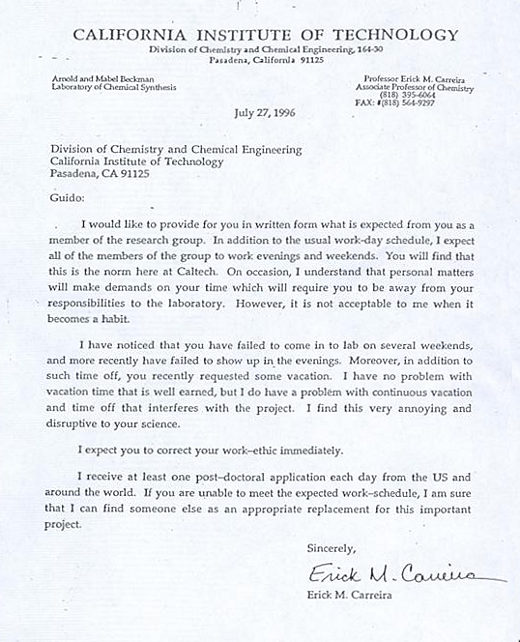In many of the research groups I’ve worked at or visited, there is a culture that endless hours in the lab equal successful researcher. (I am in a theoretical field, so requirement of long-running experiments are outside of the picture. Let's ignore them in this discussion.) In chemistry, a widely-known example of this culture is the following letter:
I would like to provide for you in written form what is expected from you as a member of the research group. In addition to the usual work-day schedule, I expect all of the members of the group to work evenings and weekends. You will find that this is the norm here at Caltech. On occasion, I understand that personal matters will make demands on your time which will require you to be away from your responsibilities to the laboratory. However, it is not acceptable to me when it becomes a habit.
I have noticed that you have failed to come in to lab on several weekends, and more recently have failed to show up in the evenings. Moreover, in addition to such time off, you recently requested some vacation. I have no problem with vacation time that is well earned, but I do have a problem with continuous vacation and time off that interferes with the project. I find this very annoying and disruptive to your science.
I expect you to correct your work-ethic immediately.
I receive at least one post-doctoral application each day from the US and around the world. If you are unable to meet the expected work-schedule, I am sure that I can find someone else as an appropriate replacement for this important project.
I have fallen prey to this during my PhD, doing very long hours. Now that I manage a research team, what is good advice to help fight this culture in my team? (Obviously, I don't want students and post-docs to get the message that little work is required either.)
Things I already do to that end:
- When a new group member comes in and they get the out-of-hours building pass (for Sundays and late nights), mention that they are not expected to use it on a regular basis.
- Avoid planning meetings at unusual hours (bank holidays, week-ends, etc.)

